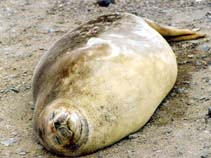Leptonychotes weddellii (Lesson, 1826)
Weddell seal| Native range | All suitable habitat | Point map | Year 2050 |

|
| This map was computer-generated and has not yet been reviewed. |
| Leptonychotes weddellii AquaMaps Data sources: GBIF OBIS |
Classification / Names Common names | Synonyms | CoL | ITIS | WoRMS
Mammalia | Carnivora | Phocidae
Environment: milieu / climate zone / depth range / distribution range Ecology
Bathydemersal; depth range 0 - 700 m (Ref. 1394). Polar; 0°N - 90°S, 180°W - 180°E
Distribution Countries | FAO areas | Ecosystems | Occurrences | Introductions
Indo-Pacific, Southern Atlantic and the Antarctic. Subtropical to polar.
Length at first maturity / Size / Weight / Age
Maturity: Lm ? range ? - ? cm Max length : 290 cm TL male/unsexed; (Ref. 1394); 330 cm TL (female); max. published weight: 450.0 kg (Ref. 1394)
Life cycle and mating behavior Maturity | Reproduction | Spawning | Eggs | Fecundity | Larvae
Main reference
References | Coordinator | Collaborators
Jefferson, T.A., S. Leatherwood and M.A. Webber 1993 FAO species Identification Guide: Marine Mammals of the World. Rome, FAO. 320 p. + 587 figures. (Ref. 1394)
IUCN Red List Status
(Ref. 130435: Version 2025-1)
CITES status (Ref. 108899)
CMS (Ref. 116361)
Threat to humans
Human uses
Fisheries: commercial
FAO - Fisheries: species profile | FishSource | Sea Around Us
Tools
More information
Max. ages / sizes
Length-weight rel.
Length-length rel.
Length-frequencies
Mass conversion
Abundance
Maturity
Fecundity
Spawning
Eggs
Egg development
Larvae
Internet sources
BHL | BOLD Systems | CISTI | DiscoverLife | FAO(Fisheries: species profile; publication : search) | Fishipedia | GenBank (genome, nucleotide) | GloBI | Gomexsi | Google Books | Google Scholar | Google | PubMed | Tree of Life | Wikipedia (Go, Search) | Zoological Record



